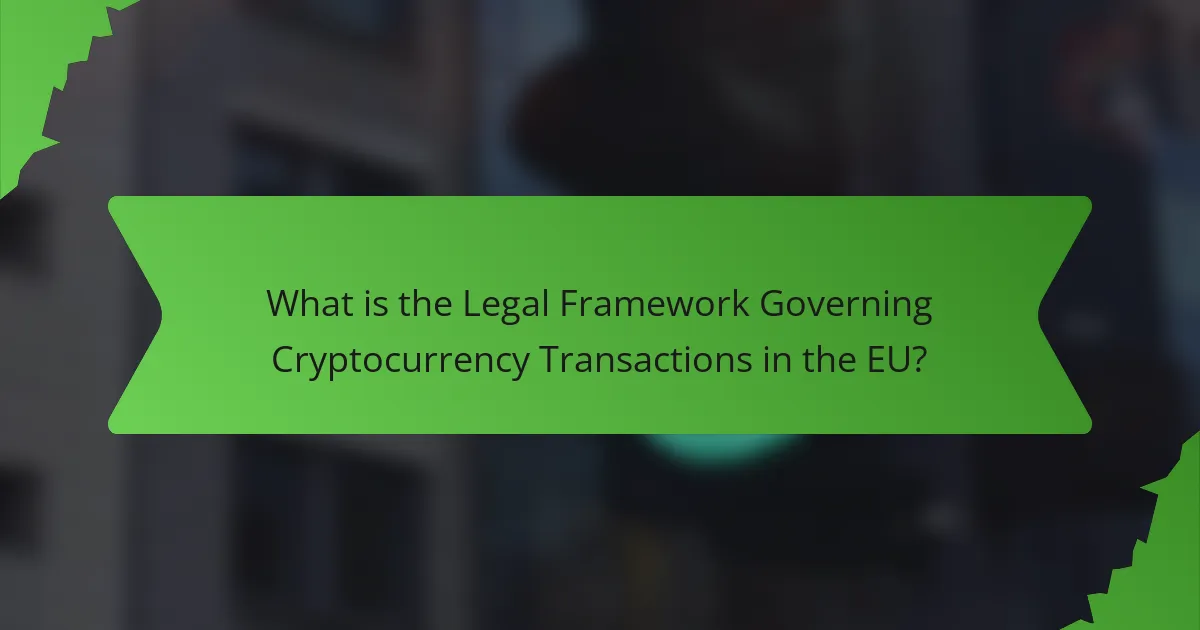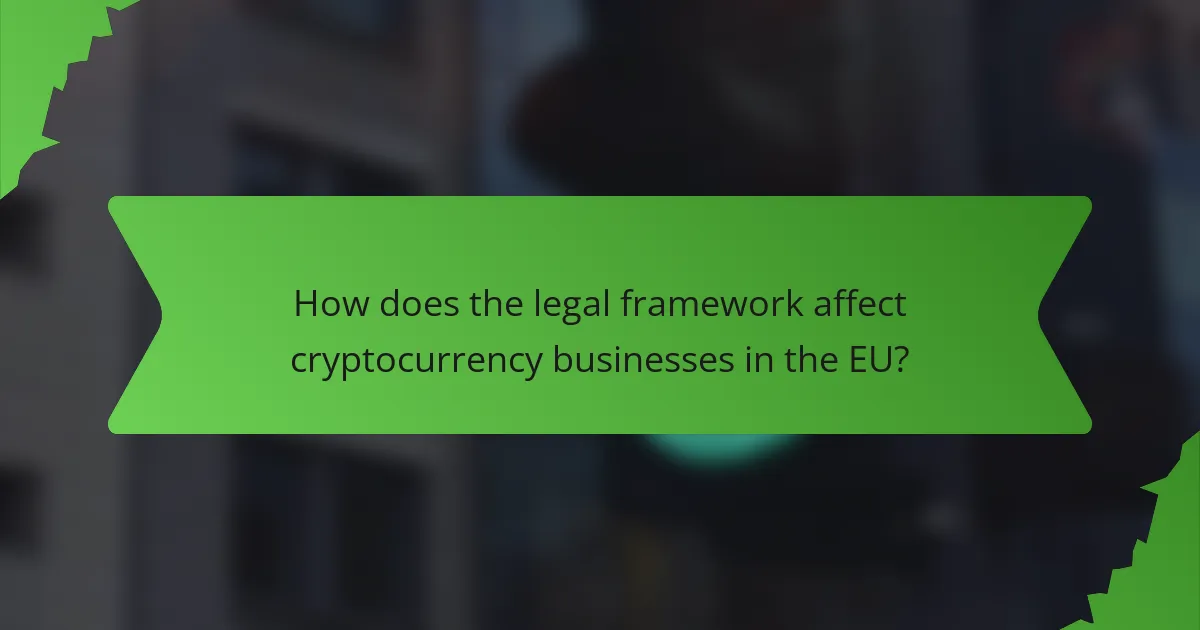The legal framework governing cryptocurrency transactions in the European Union (EU) is primarily defined by the Fifth Anti-Money Laundering Directive (5AMLD) and the Markets in Crypto-Assets Regulation (MiCAR). 5AMLD requires cryptocurrency exchanges and wallet providers to register with national authorities, conduct customer due diligence, and report suspicious activities. MiCAR aims to establish a unified regulatory environment for crypto-assets, focusing on investor protection, market integrity, and compliance with anti-money laundering (AML) regulations. The framework influences operational strategies for cryptocurrency businesses, including licensing requirements and taxation policies. Future developments are expected to enhance regulatory measures and possibly introduce a digital euro, further shaping the cryptocurrency landscape in the EU.

What is the Legal Framework Governing Cryptocurrency Transactions in the EU?
The legal framework governing cryptocurrency transactions in the EU is primarily shaped by the Fifth Anti-Money Laundering Directive (5AMLD) and the Markets in Crypto-Assets Regulation (MiCAR). 5AMLD mandates that cryptocurrency exchanges and wallet providers register with national authorities. It also requires them to conduct customer due diligence and report suspicious activities. MiCAR aims to create a comprehensive regulatory framework for crypto-assets, ensuring investor protection and market integrity. This regulation addresses the issuance and trading of various crypto-assets while promoting innovation in the financial sector. The EU’s legal approach emphasizes transparency, security, and compliance with existing financial regulations.
How did the legal framework for cryptocurrency transactions in the EU develop?
The legal framework for cryptocurrency transactions in the EU developed through a series of regulatory initiatives and legislative proposals. Initially, the EU approached cryptocurrencies with caution, recognizing their potential for innovation and risk. In 2015, the European Court of Justice ruled that Bitcoin should be treated as a currency for VAT purposes. This decision paved the way for further regulatory clarity.
In 2018, the European Commission published a proposal for a regulation on crypto-assets, aiming to create a comprehensive legal framework. The proposal sought to address issues like consumer protection and market integrity. In 2020, the EU introduced the Digital Finance Package, which included the Markets in Crypto-Assets (MiCA) proposal. MiCA aims to provide a uniform regulatory framework for cryptocurrencies across member states.
As of 2023, the EU is finalizing the MiCA regulation, which will establish clear rules for issuers and service providers. This development reflects the EU’s commitment to fostering innovation while ensuring financial stability and consumer protection.
What historical events influenced the creation of this legal framework?
The creation of the legal framework governing cryptocurrency transactions in the EU was influenced by several historical events. The 2008 financial crisis prompted a reevaluation of financial regulations. This crisis highlighted the need for greater oversight in financial markets. In 2010, Bitcoin was introduced, marking the beginning of decentralized cryptocurrencies. The rise of Bitcoin and other cryptocurrencies raised concerns about consumer protection and financial stability. In 2014, the European Parliament held discussions on regulating virtual currencies. The 2015 Action Plan on FinTech initiated steps toward regulating financial technologies, including cryptocurrencies. In 2019, the European Commission proposed the Digital Finance Strategy to address the evolving landscape of digital assets. These events collectively shaped the legal framework to ensure security and transparency in cryptocurrency transactions.
Which key regulations were implemented in the early stages?
The key regulations implemented in the early stages of the legal framework governing cryptocurrency transactions in the EU include the Fifth Anti-Money Laundering Directive (5AMLD) and the Markets in Crypto-Assets Regulation (MiCAR). The 5AMLD was adopted in 2018 and aimed to increase transparency and reduce the risk of money laundering and terrorist financing in the cryptocurrency sector. It required cryptocurrency exchanges and wallet providers to register with national authorities and comply with Know Your Customer (KYC) regulations. MiCAR, proposed in 2020, seeks to create a comprehensive regulatory framework for crypto-assets in the EU, ensuring consumer protection and market integrity. These regulations were crucial in establishing a legal basis for cryptocurrency operations within the EU.
What are the main components of the legal framework?
The main components of the legal framework governing cryptocurrency transactions in the EU include regulations, directives, and guidelines. Regulations provide binding legal standards across member states. Directives set out goals that member states must achieve, allowing flexibility in implementation. Guidelines offer interpretative assistance to help stakeholders comply with existing laws. Additionally, anti-money laundering (AML) laws and consumer protection regulations are crucial. The European Securities and Markets Authority (ESMA) plays a significant role in overseeing compliance. These components ensure a cohesive legal environment for cryptocurrency activities in the EU.
What specific regulations govern cryptocurrency transactions in the EU?
The specific regulations governing cryptocurrency transactions in the EU include the Fifth Anti-Money Laundering Directive (5AMLD) and the Markets in Crypto-Assets Regulation (MiCA). 5AMLD, implemented in January 2020, requires cryptocurrency exchanges and wallet providers to register and comply with anti-money laundering (AML) regulations. MiCA, proposed in September 2020, aims to create a comprehensive regulatory framework for crypto-assets, ensuring consumer protection and market integrity. These regulations reflect the EU’s commitment to fostering innovation while mitigating risks associated with cryptocurrencies.
How do these regulations address consumer protection?
These regulations address consumer protection by establishing clear guidelines for cryptocurrency transactions. They require transparency in the information provided to consumers. This includes disclosing risks associated with cryptocurrency investments. Additionally, regulations mandate that firms implement measures to prevent fraud and scams. They also set standards for safeguarding consumer funds. This includes ensuring adequate security measures are in place. Furthermore, regulations provide consumers with avenues for recourse in case of disputes. These measures aim to enhance consumer trust in the cryptocurrency market.
What challenges exist within the legal framework for cryptocurrency transactions?
The legal framework for cryptocurrency transactions faces several challenges. One major challenge is regulatory uncertainty. Different EU member states have varying regulations, leading to confusion for businesses and users. Another challenge is the lack of a unified legal definition of cryptocurrency. This ambiguity complicates compliance and enforcement efforts. Additionally, issues related to consumer protection are prevalent. Many users are unaware of the risks associated with cryptocurrency investments.
There are also challenges surrounding anti-money laundering (AML) and know your customer (KYC) regulations. Cryptocurrency transactions can be anonymous, making it difficult to trace illicit activities. Furthermore, the rapid evolution of technology outpaces existing laws. Regulators struggle to keep up with innovations in blockchain and cryptocurrency. Finally, taxation of cryptocurrency transactions remains complex. Different jurisdictions apply different tax rules, creating inconsistencies and compliance difficulties.
What ambiguities or gaps can be found in the current regulations?
Current regulations on cryptocurrency transactions in the EU exhibit several ambiguities and gaps. One significant ambiguity is the lack of a clear definition of cryptocurrencies across different member states. This inconsistency can lead to varying interpretations and enforcement of regulations.
Another gap is the absence of comprehensive guidelines for taxation on cryptocurrency gains. Many EU countries have not established clear rules, creating uncertainty for investors and businesses.
Additionally, regulations surrounding Initial Coin Offerings (ICOs) are often vague. This lack of clarity can result in potential fraud and investor protection issues.
Furthermore, there is insufficient regulation concerning the accountability of cryptocurrency exchanges. Without clear standards, these platforms may operate without adequate oversight, increasing risks for users.
Finally, existing regulations may not adequately address emerging technologies in the cryptocurrency space, such as decentralized finance (DeFi) and non-fungible tokens (NFTs). This gap indicates a need for ongoing regulatory adaptation to keep pace with rapid technological advancements.
How do differing national laws impact the EU-wide framework?
Differing national laws significantly impact the EU-wide framework for cryptocurrency transactions. Each EU member state has its own regulations that can create inconsistencies. For instance, variations in taxation, licensing, and consumer protection laws can lead to regulatory arbitrage. This means that businesses may choose to operate in jurisdictions with more favorable laws. Consequently, this fragmentation can hinder the development of a cohesive EU market for cryptocurrencies. The European Commission has acknowledged these challenges and aims to harmonize regulations to ensure a unified approach. In 2020, the Commission proposed the Digital Finance Package to address these disparities. This initiative seeks to create a more integrated financial landscape across the EU.

How does the legal framework affect cryptocurrency businesses in the EU?
The legal framework significantly impacts cryptocurrency businesses in the EU. It establishes regulations that govern operations, compliance, and security. The Markets in Crypto-Assets (MiCA) regulation is a key component, aiming to create a unified regulatory environment. This regulation provides clarity on licensing requirements for cryptocurrency service providers. Compliance with anti-money laundering (AML) and counter-terrorism financing (CTF) regulations is also mandatory. Businesses must implement robust KYC (Know Your Customer) processes to verify user identities. Additionally, the legal framework influences taxation policies on cryptocurrency transactions. Overall, adherence to these regulations shapes operational strategies for cryptocurrency businesses in the EU.
What compliance requirements must cryptocurrency businesses adhere to?
Cryptocurrency businesses must adhere to Anti-Money Laundering (AML) and Counter-Terrorism Financing (CTF) regulations. These regulations require businesses to implement Know Your Customer (KYC) processes. KYC involves verifying the identity of clients to prevent illicit activities. Additionally, businesses must report suspicious transactions to relevant authorities. Compliance with the General Data Protection Regulation (GDPR) is also essential. GDPR governs the handling of personal data in the EU. Failure to comply with these regulations can result in significant fines and legal repercussions. The European Union’s Fifth Anti-Money Laundering Directive (5AMLD) specifically outlines these requirements for cryptocurrency firms.
How do Anti-Money Laundering (AML) regulations apply to cryptocurrency transactions?
Anti-Money Laundering (AML) regulations require cryptocurrency exchanges to implement specific compliance measures. These measures include customer due diligence (CDD) and reporting suspicious activities. Cryptocurrency exchanges must verify the identity of their users. This process helps prevent illicit activities such as money laundering and terrorist financing.
In the EU, the 5th Anti-Money Laundering Directive (5AMLD) specifically extends AML regulations to cryptocurrency service providers. This directive mandates that these providers register with national authorities. They must also maintain records of transactions and report any suspicious transactions to relevant authorities.
The European Court of Justice has upheld the applicability of AML regulations to cryptocurrency transactions. This reinforces the legal obligation for compliance among cryptocurrency businesses in the EU.
What licensing requirements are necessary for cryptocurrency exchanges?
Cryptocurrency exchanges are required to obtain licenses to operate legally. The specific licensing requirements vary by jurisdiction within the EU. Most countries require exchanges to register with financial regulatory authorities. They must comply with Anti-Money Laundering (AML) and Counter-Terrorism Financing (CTF) regulations. Exchanges typically need to implement Know Your Customer (KYC) procedures. This includes verifying user identities to prevent fraud. Additionally, some jurisdictions may require capital reserves to ensure operational stability. For example, Malta requires a Virtual Financial Assets License for exchanges. These regulations aim to protect consumers and maintain market integrity.
What are the implications of non-compliance with the legal framework?
Non-compliance with the legal framework governing cryptocurrency transactions in the EU can lead to severe penalties. Entities may face hefty fines imposed by regulatory authorities. For example, the General Data Protection Regulation (GDPR) allows fines up to 4% of annual global turnover. Additionally, non-compliance can result in legal actions, including lawsuits from affected parties. Businesses may also suffer reputational damage, which can impact customer trust and market position. Furthermore, non-compliance can lead to restrictions on operational capabilities, limiting access to banking services or exchanges. This creates significant barriers to conducting legitimate cryptocurrency transactions. Overall, the implications can severely hinder business operations and financial viability.
What penalties do businesses face for non-compliance?
Businesses face significant penalties for non-compliance with cryptocurrency regulations in the EU. These penalties can include hefty fines, which may reach millions of euros depending on the severity of the violation. Non-compliance can also result in the suspension or revocation of licenses to operate in the financial sector. Additionally, businesses may face legal action from regulatory authorities, leading to further financial and reputational damage. The EU’s Anti-Money Laundering Directive imposes strict obligations, and failure to meet these can lead to enforcement actions. For instance, in 2021, the European Securities and Markets Authority highlighted the risk of fines for companies failing to comply with the Markets in Crypto-Assets Regulation.
How can businesses mitigate the risks of non-compliance?
Businesses can mitigate the risks of non-compliance by implementing comprehensive compliance programs. These programs should include regular training for employees on relevant regulations. Conducting thorough audits helps identify potential compliance gaps. Developing clear policies and procedures ensures consistent adherence to legal requirements. Engaging legal experts for advice on evolving regulations is crucial. Utilizing technology for compliance tracking can enhance efficiency and accuracy. Regularly reviewing and updating compliance strategies keeps businesses aligned with legal changes. In the EU context, understanding the specifics of the Markets in Crypto-Assets Regulation (MiCA) is essential for compliance.

What future developments can be expected in the legal framework for cryptocurrency transactions in the EU?
Future developments in the legal framework for cryptocurrency transactions in the EU will likely include comprehensive regulations. The European Commission is working on the Markets in Crypto-Assets (MiCA) proposal. This aims to create a unified regulatory environment across EU member states. MiCA will address issues such as market integrity and investor protection. Additionally, the EU is expected to enhance anti-money laundering (AML) measures for cryptocurrency transactions. This aligns with the Financial Action Task Force (FATF) guidelines. The European Central Bank may also introduce a digital euro, impacting the cryptocurrency landscape. These developments aim to foster innovation while ensuring security and compliance.
What upcoming regulations are being discussed or proposed?
Upcoming regulations being discussed in the EU focus on cryptocurrency transactions. The European Commission is proposing the Markets in Crypto-Assets (MiCA) regulation. This aims to create a comprehensive regulatory framework for digital assets. MiCA seeks to provide legal clarity and consumer protection. The regulation addresses issues like market integrity and anti-money laundering. It is currently under review by the European Parliament and Council. Stakeholders are providing feedback on the proposals. The timeline for implementation is expected to be in 2024.
How might the EU’s approach to cryptocurrency evolve in the next few years?
The EU’s approach to cryptocurrency is likely to become more regulated and standardized in the coming years. This evolution will focus on enhancing consumer protection and preventing financial crime. The EU is expected to implement comprehensive legislation, such as the Markets in Crypto-Assets Regulation (MiCA). MiCA aims to create a unified regulatory framework across member states. It will address issues like transparency, market integrity, and investor safeguards. Furthermore, the EU may explore central bank digital currencies (CBDCs) to modernize its monetary system. As cryptocurrency adoption increases, the EU will likely prioritize collaboration with international regulatory bodies. This will ensure a cohesive global approach to cryptocurrency governance.
What best practices should cryptocurrency businesses follow to remain compliant?
Cryptocurrency businesses should implement comprehensive compliance programs. These programs must include Know Your Customer (KYC) procedures. KYC helps verify the identities of customers and prevent fraud. Businesses should also establish Anti-Money Laundering (AML) protocols. AML measures help detect and report suspicious activities. Regularly updating compliance policies is essential to adapt to regulatory changes. Training staff on compliance requirements ensures adherence to regulations. Additionally, maintaining accurate records of transactions is crucial for audits. Engaging legal experts can provide guidance on evolving laws and regulations.
How can businesses stay informed about regulatory changes?
Businesses can stay informed about regulatory changes by subscribing to industry newsletters and government updates. Regularly reviewing official government websites is essential. Engaging with legal experts or consultants can provide tailored insights. Participating in industry associations offers networking opportunities and shared knowledge. Attending conferences and webinars helps in understanding evolving regulations. Utilizing regulatory technology tools can streamline compliance monitoring. Following relevant social media channels can provide real-time updates. Research shows that proactive engagement in these areas leads to better compliance and risk management.
What resources are available to help businesses navigate the legal framework?
Businesses can access various resources to navigate the legal framework governing cryptocurrency transactions in the EU. Legal firms specializing in cryptocurrency law provide consultancy services. Government websites offer guidelines and regulatory updates. Industry associations publish best practices and compliance documents. Online courses and webinars educate businesses on legal obligations. Academic research papers analyze legal implications in detail. Networking events connect businesses with legal experts. These resources help ensure compliance with EU regulations.
The legal framework governing cryptocurrency transactions in the EU is primarily defined by the Fifth Anti-Money Laundering Directive (5AMLD) and the Markets in Crypto-Assets Regulation (MiCAR). This framework establishes requirements for registration, customer due diligence, and reporting suspicious activities to enhance transparency and security in the cryptocurrency market. The article outlines the development of these regulations, key components, compliance requirements, and the implications of non-compliance for businesses. It also discusses challenges within the legal framework, including regulatory uncertainty and varying national laws, while highlighting future developments in EU cryptocurrency regulations.




